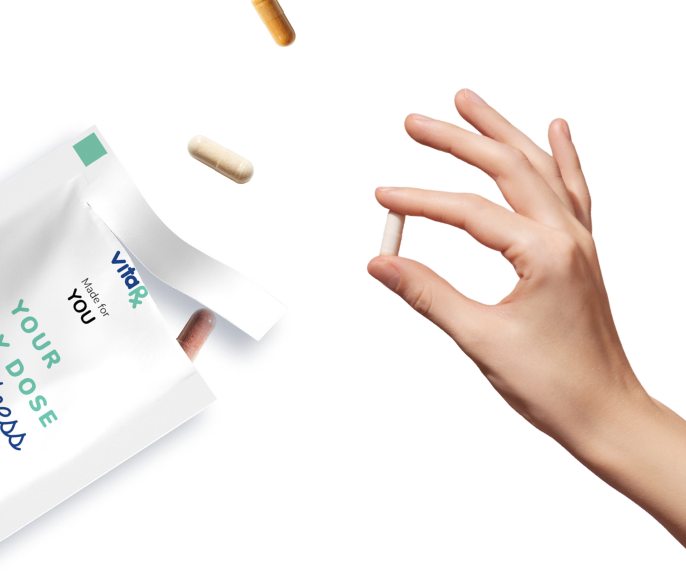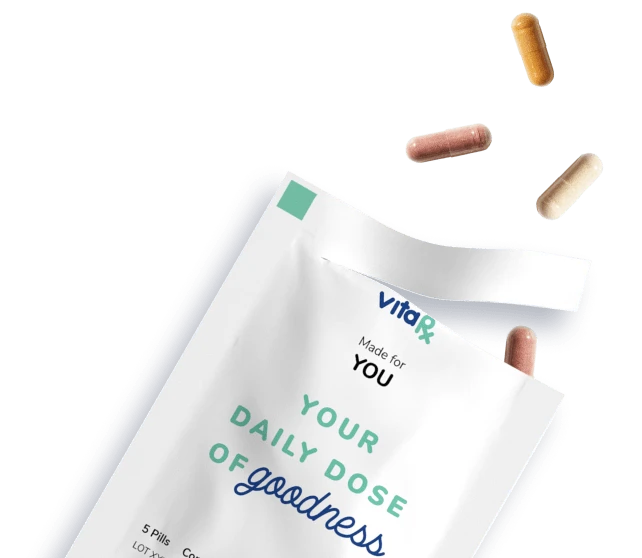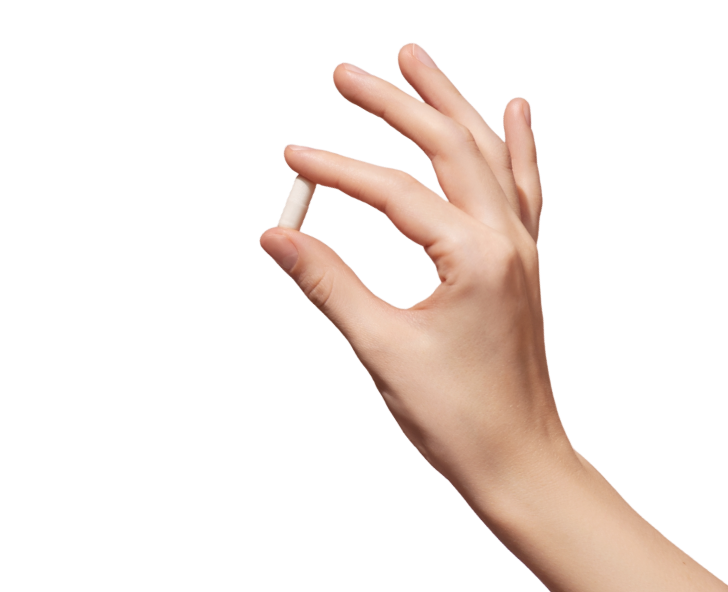Last update: March 25, 2025
5 minute read
Zinc for Hair Loss
Wondering if zinc might be the secret weapon against hair loss? Dive into the science behind zinc and discover how this essential mineral may support hair regrowth.

By Stephanie Wright, RN, BSN
Edited by Dr. Dimitar Marinov, MD, RDN, PhD

Hair loss may be a distressing experience, leaving many searching for effective remedies. Among the myriad of solutions, zinc has emerged as a potential ally in combating hair thinning and promoting regrowth. But does it really work, or is it just another overhyped supplement? Let's unravel the truth behind zinc's role in hair health.
Key takeaways
- Zinc plays a crucial role in hair follicle health and the hair growth cycle
- Studies suggest zinc supplements may improve hair growth in conditions like alopecia areata and female pattern hair loss
- Maintaining balanced zinc levels is essential; both too much or too little may negatively impact hair health
Efficacy of zinc supplements for hair loss
You've probably heard that zinc is good for your hair, but what does the research say? A study involving patients with alopecia areata—a condition causing hair to fall out in patches—found promising results with zinc supplementation.
The study participants who took supplements showed a zinc deficiency. It also cited studies that show hair regrowth with supplementation. These findings indicate that zinc may play a beneficial role in treating certain types of hair loss.
Female pattern hair loss
In another study, combining chelated zinc with topical minoxidil showed effectiveness for women experiencing pattern hair loss. The addition of zinc appeared to enhance the hair regrowth process, suggesting a positive synergy between zinc and other treatments.
— Dr. Dimitar Marinov, MD, RDN, PhDBoth too much or too little zinc may have a negative effect on hair growth. Consuming enough zinc as a part of a balanced nutrition may be beneficial for hair growth.
Mechanism of action
So, how does zinc influence hair growth?
Essential for hair follicle health
Zinc is vital for maintaining healthy hair follicles. It aids in:
- DNA and RNA production: Necessary for efficient division of follicle cells.
- Supporting the anagen phase: The active growth stage of the hair cycle.
Hormone regulation
Zinc helps regulate hormone levels, which is crucial in preventing hair loss. It may:
- Balance testosterone levels: High testosterone may lead to hair thinning.
- Support thyroid function: Thyroid imbalances often contribute to hair loss.
However, it's important to note that zinc is not effective as a DHT blocker, the hormone directly linked to pattern baldness.
Serum zinc levels and hair growth
Is there a connection between zinc levels in the body and hair health?
Impact of supplementation
Research indicates that people with hair loss conditions often have lower serum zinc levels. Supplementation may lead to:
- Significant increases in serum zinc levels: A positive response group saw a 40.9 µg/dl increase.
- Improvement in hair growth density: Patients with telogen effluvium and androgenic alopecia showed noticeable improvements after zinc supplementation.
Dietary sources of zinc
Before reaching for supplements, consider boosting your zinc intake through diet.
Zinc-rich foods
Including foods high in zinc may support hair health naturally:
- Oysters: One of the richest sources of zinc.
- Red meat and poultry: Provide significant amounts.
- Beans, nuts, and whole grains: Great for vegetarians and vegans.
Balanced nutrition
A well-rounded diet not only provides zinc but also other essential nutrients that support overall hair health. Consider reading about top brain-boosting foods and vital supplements, which may also contribute to your nutritional intake.
Dosage and safety
Before you rush to the pharmacy, let's talk about dosage.
Recommended intake
- Daily recommended intake: 8-11 mg of zinc.
- For hair loss support: Often, a dose of 15 mg delivered as a chelate is suggested.
VitaRx Tip
However, it's advised not to exceed this dose for more than 2-3 weeks to prevent adverse effects.
Risks of excessive zinc
Too much zinc may be counterproductive:
- Inhibits hair follicle growth: High doses may lead to increased hair shedding.
- Interferes with other minerals: Excess zinc may disrupt the absorption of magnesium and iron.
Always consult a healthcare professional before starting any supplementation regimen.
Side effects and additional considerations
Mild side effects
Some people may experience:
- Nausea: A common mild side effect reported in studies.
Combining with other nutrients
To maximize benefits:
- Pair zinc with copper supplements: Zinc may reduce copper levels in the body.
- Consider selenium: Its antioxidant properties may support hair health.
Eat healthier
Zinc doesn't just affect your hair—it's involved in over 300 enzymatic reactions in the body! From supporting your immune system to aiding in wound healing, this mineral is a true multitasker. Learn more about the health benefits of zinc.
Frequently asked questions (FAQ)
Here are some of the most frequently asked questions about zinc for hair loss.
Final thoughts
Zinc appears to be a promising player in the quest to combat hair loss. Studies suggest that, especially for conditions like alopecia areata and female pattern hair loss, zinc supplementation may offer benefits.
However, balance is crucial—both deficiency and excess may negatively impact hair health. Before starting any new supplement, it's wise to consult with a healthcare professional to tailor the approach to your individual needs.
Sources and references
- Serum Zinc Concentration in Patients with Alopecia Areata - PMC
- Interventions for female pattern hair loss - PMC
- Zinc - Consumer
- The Role of Zinc in Selected Female Reproductive System Disorders - PMC
- The Role of Zinc in Thyroid Hormones Metabolism
- The Role of Zinc in Thyroid Hormones Metabolism
- Zinc – The Nutrition Source
- Function and mechanism of zinc metalloenzymes - PubMed
- Effects of Zinc Supplementation on Endocrine Outcomes in Women with Polycystic Ovary Syndrome: a Randomized, Double-Blind, Placebo-Controlled Trial - PubMed
Author

Stephanie Wright
Stephanie brings over 13 years of diverse nursing experience to the table, having honed her expertise in critical care, mental health, and utilization management. Her journey as a registered nurse across these various healthcare sectors underscores her adaptability and deep commitment to patient care.
Fact checker

Dr. Dimitar Marinov
Dr. Marinov has years of experience in scientific research and preventive and clinical medicine. His publications in peer-reviewed journals are on nutritional status, physical activity, and musculoskeletal disorders among adolescents.
At VitaRx, we're not just passionate about our work — we take immense pride in it. Our dedicated team of writers diligently follows strict editorial standards, ensuring that every piece of content we publish is accurate, current, and highly valuable. We don't just strive for quality; we aim for excellence.
Related posts
While you're at it, here are some other relevant articles you might be interested in.

Get your personalized vitamin recommendations in less than
5 minutes.
Get your personalized vitamin recommendations in less than
5 minutes.







